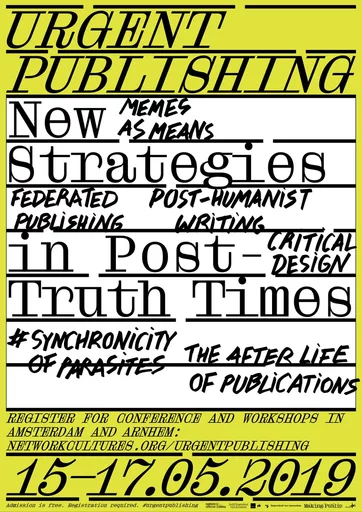15-17 May 2019, the Institute of Network Cultures, ArtEZ University of the Arts and Willem de Kooning Academy organized Urgent Publishing, a 3-day event with discussions, explorations and experiments about publishing strategies in post-truth times.
Session 1: Janneke Adema & Gary Hall. The Carrier Bag Theory of Non-Fiction
This plural-voiced presentation will focus on what publishing does rather than what publishing is. It will intervene in the debate over publishing in the post-truth era by shifting the focus away from a hegemonic modular and object-centered understanding, toward a more relational model of posthumanities publishing. Here research, reading, writing, and the published text are understood as emerging from the intra-actions of a heterogeneous constellation of both human and nonhuman actors, many of which are ignored by existing theories of media. Drawing boundaries – whether it involves conceptualizing information containers via the figure of the net, leaf or carrier bag – is unavoidable from such a posthumanistic perspective. Yet for us, it is a matter of drawing these boundaries differently, in a manner that does not impose on such relational intra-actions a version of capitalism’s old, closed, pre-digital logic. This presentation will discuss posthumanities publishing experiments that have emphasized different forms of relationality – forms that do not revolve primarily around the published text-as-object, or indeed the individual human author-as-subject. In discussing these publishing experiments it will show how strategizing publishing in terms of urgent and non-urgent, fast and slow can be unhelpful: the art of critique requires its own pace.
Session 1: Janneke Adema & Gary Hall. The Carrier Bag Theory of Non-Fiction
This plural-voiced presentation will focus on what publishing does rather than what publishing is. It will intervene in the debate over publishing in the post-truth era by shifting the focus away from a hegemonic modular and object-centered understanding, toward a more relational model of posthumanities publishing. Here research, reading, writing, and the published text are understood as emerging from the intra-actions of a heterogeneous constellation of both human and nonhuman actors, many of which are ignored by existing theories of media. Drawing boundaries – whether it involves conceptualizing information containers via the figure of the net, leaf or carrier bag – is unavoidable from such a posthumanistic perspective. Yet for us, it is a matter of drawing these boundaries differently, in a manner that does not impose on such relational intra-actions a version of capitalism’s old, closed, pre-digital logic. This presentation will discuss posthumanities publishing experiments that have emphasized different forms of relationality – forms that do not revolve primarily around the published text-as-object, or indeed the individual human author-as-subject. In discussing these publishing experiments it will show how strategizing publishing in terms of urgent and non-urgent, fast and slow can be unhelpful: the art of critique requires its own pace.
related events

Urgent Publishing
related content